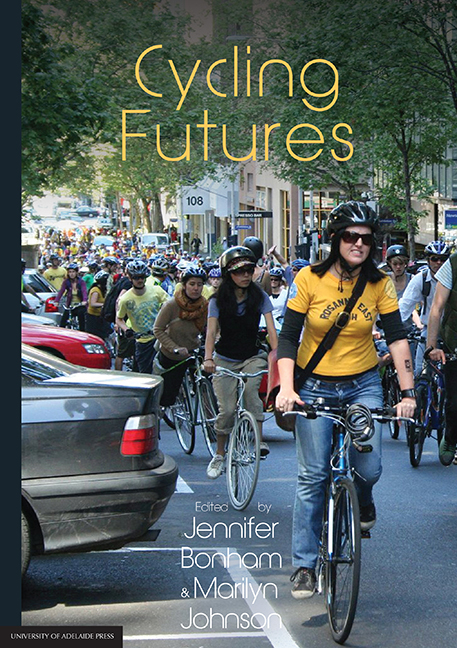Book contents
- Frontmatter
- Contents
- Preface
- Editors
- Contributors
- PART I Current challenges
- 1 Cycling: Bringing the future into the present
- 2 A glimpse at Australia's cycling history
- 3 Health benefits of cycling
- 4 An epidemiological profile of cycling injury in Australia and New Zealand
- 5 Faster than the speed of bikes
- 6 Economics of everyday cycling and cycling facilities
- 7 Cycling and sustainable transport
- 8 Cycle touring
- PART II Strategies for change
6 - Economics of everyday cycling and cycling facilities
from PART I - Current challenges
Published online by Cambridge University Press: 25 July 2017
- Frontmatter
- Contents
- Preface
- Editors
- Contributors
- PART I Current challenges
- 1 Cycling: Bringing the future into the present
- 2 A glimpse at Australia's cycling history
- 3 Health benefits of cycling
- 4 An epidemiological profile of cycling injury in Australia and New Zealand
- 5 Faster than the speed of bikes
- 6 Economics of everyday cycling and cycling facilities
- 7 Cycling and sustainable transport
- 8 Cycle touring
- PART II Strategies for change
Summary
Introduction
Economics is the study of choice. In narrow terms, economics is concerned with choices in the production or consumption of goods and services traded in the market. In broader terms, economics matters whenever people need to make a choice amongst various options.
People make a choice in travelling amongst various transport modes. The use of bikes as a transport mode varies greatly depending on regional economic and social factors. For example, fossil-fuel-burning transport modes inclusive of motorised bikes and tricycles (also known as rickshaws or tuktuks) are widely used for relatively long-distance travelling in developing countries. Riding pushbikes may not be a desirable option for long-distance travelling in developing countries where the cycling infrastructure is not well established. In contrast, in some developed countries, cycling can be a transport mode even for long-distance travelling for recreation and physical fitness (Börjesson & Eliasson, 2012a; Pattinson & Thomson, 2014).
This chapter discusses the economics of cycling as a choice of transport, based on the neoclassical approach to the economic way of thinking. In the neoclassical economics paradigm, it is assumed that human beings are economic beings (Homo economicus) and are responsive to economic (dis)incentives. When some activity is found to become more costly and less beneficial to undertake, a ‘rational’ economic being is expected to do it less. Conversely, when doing something becomes less costly and more beneficial, the ‘rational’ person tends to do it more. When decisions are made with respect to transportation, the benefits and costs of each of the available transportation options are weighed up. In doing so, non-market benefits and costs are also taken into account.
The economics of cycling is not just about cycling as a choice of transport mode, but also about cycling facilities as a public choice of road use. In fact, no clear dividing line can be drawn between the benefits of cycling and the benefits of cycling facilities because the two are inextricably linked.
- Type
- Chapter
- Information
- Cycling Futures , pp. 107 - 130Publisher: The University of Adelaide PressPrint publication year: 2015



